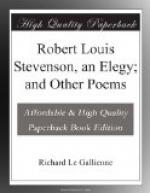Or, may be, flashing all intent
At call of some stern argument,
When the New Woman fain would be,
Like the Old Male, her husband, free.
The prose-man takes his mighty lyre
And talks like music set on fire!
The while the merry crowd slips by
Glittering and glancing to the eye,
All happy lovers on their way
To make a golden end of day—
Ah! Cafe truly called La Paix!
Or at the pension I would be
With Transatlantic maidens three,
The same, I vow, who once of old
Guarded with song the trees of gold.
O Lady, lady, Vis-a-Vis,
When shall I cease to think of thee,
On whose fair head the Golden Fleece
Too soon, too soon, returns to Greece—
Oh, why to Athens e’er depart?
Come back, come back, and bring my heart!
And she whose gentle silver grace,
So wise of speech and kind of face,
Whose every wise and witty word
Fell shy, half blushing to be heard.
Last, but ah! surely not least dear,
That blithe and buxom buccaneer,
Th’ avenging goddess of her sex,
Born the base soul of man to vex,
And wring from him those tears and sighs
Tortured from woman’s heart and eyes.
Ah! fury, fascinating, fair—
When shall I cease to think of her!
Paris, half Angel, half Grisette,
I would that I were with thee yet,
But London waits me, like a wife,—
London, the love of my whole life.
Tell her not, Paris, mercy me!
How I have flirted, dear, with thee.
[1] By kind permission of the Editor of The Yellow Book.
ALFRED TENNYSON
(Westminster, October 12, 1892)
Great man of song, whose glorious laurelled head
Within the lap of death sleeps well at
last,
Down the dark road, seeking the deathless dead,
Thy faithful, fearless, shining soul hath
passed.
Fame blows his silver trumpet o’er thy sleep,
And Love stands broken by thy lonely lyre;
So pure the fire God gave this clay to keep,
The clay must still seem holy for the
fire.
Poor dupes of sense, we deem the close-shut eye,
So faithful servant of his golden tongue,
Still holds the hoarded lights of earth and sky,
We deem the mouth still full of sleeping
song.
We mourn as though the great good song he gave
Passed with the singer’s own informing
breath:
Ah, golden book, for thee there is no grave,
Thine is a rhyme that shall not taste
of death.
Great wife of his great heart—’tis
yours to mourn,
Son well-beloved, ’tis yours, who
loved him so:
But we!—hath death one perfect page out-torn
From the great song whereby alone we know
The splendid spirit imperiously shy,—
Husband to you and father—we
afar
Hail poet of God, and name as one should cry:
‘Yonder a king, and yonder lo! a
star!’




